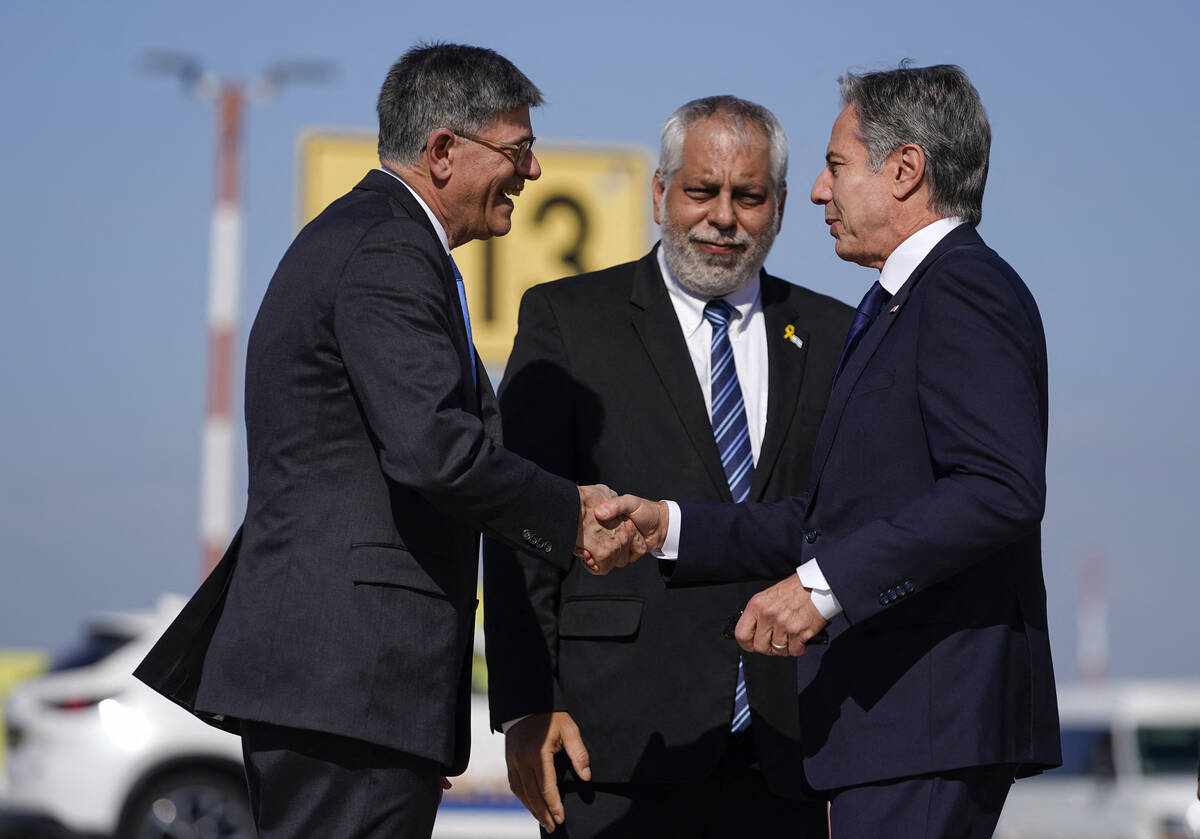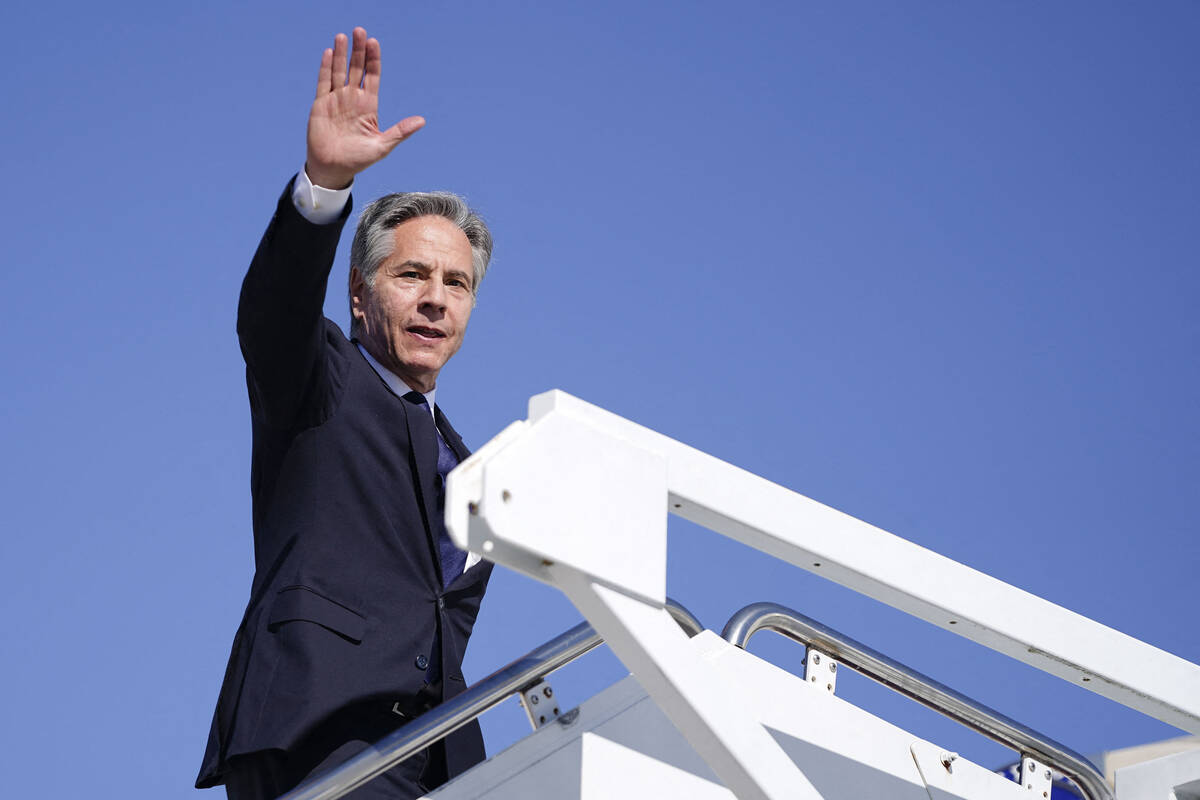Blinken eyes truce prospects as Israel presses battlefield gains
The U.S. top diplomat arrived in Israel on Tuesday and met Prime Minister Benjamin Netanyahu, as President Joe Biden makes a last attempt before the American elections to reach cease-fires in Lebanon and Gaza.
Antony Blinken, the U.S. secretary of state, discussed the prospect of a broad truce in Israel’s multi-front conflict against Iranian-supported terrorist groups. Yet the White House may have to be content with preventing hostilities from escalating before the Nov. 5 vote, given that Israeli leaders are buoyed by their recent gains on the battlefield and determined to press on.
Netanyahu is adamant Israel will continue with its military operations against Hezbollah, regardless of international pressure for a de-escalation, according to a Western official who met him in recent days.
Blinken’s trip, his 11th to the Middle East since Israel’s war against Hamas terrorists began in October last year, has been lent urgency by the looming U.S. polls and Israel’s promise of major retaliation against Iran for a missile attack on Oct. 1.
The U.S. is trying to persuade Israel to avoid hitting Iran’s oil-export or nuclear sites, which it fears could trigger a regional war and push up energy prices.
Meanwhile, the FBI said Tuesday that it is investigating the unauthorized release of classified documents on Israel’s preparation for a retaliatory attack on Iran.
Iran reiterated Tuesday that Arab states should not allow the U.S. or Israel to use their airspace or bases in their territories for Israel’s expected strike. Iran warned them that, if they do, they’ll be potential targets should it opt for a counter-strike.
Netanyahu and Blinken met in Jerusalem and the U.S. diplomat also aired ideas for Gaza’s recovery once fighting in the Palestinian territory stops. In addition, he spoke to Israel’s minister of strategic affairs, Ron Dermer, and was scheduled to meet Defense Minister Yoav Gallant.
Hamas-led terrorists on Oct. 7, 2023, killed around 1,200 people in Israel, mostly civilians, and took another 250 hostage. Around 100 of the captives are still held in Gaza, a third of whom are believed to be dead.
Israel’s retaliatory offensive has killed more than 42,000 Palestinians in Gaza, according to the Hamas-run Health Ministry in Gaza, which doesn’t distinguish between civilians and combatants.
Hamas is all but defeated in Gaza and last week Israel killed its leader, Yahya Sinwar. Still, Hamas fighters are regrouping in part of the north of Gaza, causing Israel to step up operations.
To Netanyahu, Blinken “underscored the need to capitalize on Israel’s successful action to bring Yahya Sinwar to justice by securing the release of all hostages and ending the conflict in Gaza,” according to the State Department. He also urged the Israeli leader to increase the amount of aid getting into Gaza.
Israel-Hezbollah strikes
Most of Israel’s military force is now concentrated in Lebanon, the domain of Hezbollah, which has also been severely weakened by Israeli attacks and had most of its leadership killed in the last six weeks.
Even so, Israel and Hezbollah continued to trade heavy fire over the past 24 hours. An Israeli overnight attack near Beirut’s Rafik Hariri University Hospital killed 13 people and wounded almost 60, according to Lebanese officials. They said the strike caused major damage to the hospital, one of the biggest in Lebanon.
Israel said it did not hit the hospital and instead struck a nearby Hezbollah target.
Hezbollah launched several missiles toward Tel Aviv hours before Blinken landed. The Israeli military said it intercepted most of the projectiles or they fell in open areas.
Hezbollah’s chief spokesman, Mohammed Afif, said the group was behind the Saturday drone attack on Netanyahu’s home in the coastal town of Caesarea. He hinted that it might attempt future strikes on Netanyahu’s home. Israel has said neither the prime minister nor his wife were home at the time of the attack.
With Vice President Kamala Harris facing off against Republican nominee former President Donald Trump in two weeks, the Biden administration is keen to bring an end to the Middle East’s various conflicts involving its key ally Israel.
After Israel, Blinken is likely to visit Arab states later this week.
Washington has previously looked to Egypt and Qatar to broker a cease-fire with Hamas under which Israel would recover hostages still held in Gaza and the territory would receive more aid. Such a deal could calm the situation in Lebanon. Hezbollah — like Hamas, classed as a terrorist organization by the U.S. — has said its attacks on Israel are in solidarity with the Palestinian group.
Netanyahu and his Cabinet have shown little interest, however, in offering a reprieve to Israel’s enemies yet.
This week, the Israeli military widened its campaign in Lebanon to target Al Qard Al Hassan Association, a bank-like institution it says helps fund Hezbollah’s operations. It also accused the Shiite group of hoarding cash and gold in a bunker under another Beirut hospital.
Administrators of the hospital, Sahel General, denied that.
U.N. resolution
Biden’s main envoy for Israel-Hezbollah affairs, Amos Hochstein, was in Beirut on Monday to speak to allies of the terrorist group. He was trying to see under what conditions a U.N. Security Council resolution — known as 1701, it helped end a 2006 war between Israel and Hezbollah — could be fully implemented by both sides.
Israel wants Hezbollah to disarm and keep its fighters away from the Israeli border, as per 1701’s stipulations.
But Israel has given no indication it will cease surveillance flights over Lebanon and has indicated it wants the right to strike Hezbollah post-conflict if its fighters approach the Israeli territory.
While that would be hard for Lebanese politicians to accept, it would enable the tens of thousands of Israelis displaced from northern communities to return home, a key objective for Netanyahu.



















